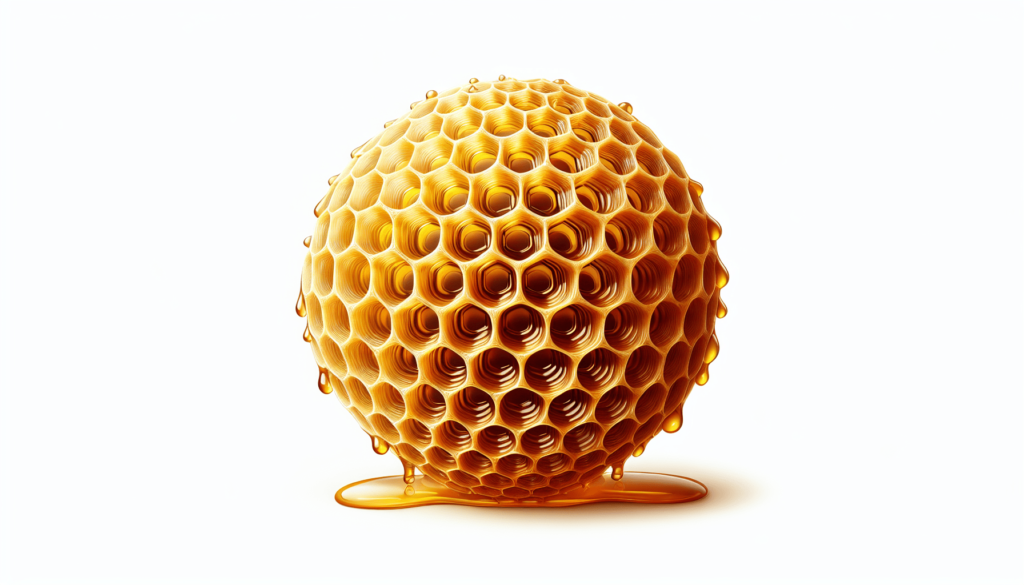If you’re looking to elevate your skincare routine to the next level, honey might just be the secret ingredient you’ve been missing. But not just any honey will do the trick – there are specific types that are highly recommended for skincare. From manuka honey with its powerful antibacterial properties to raw honey packed with antioxidants, this article explores the various types of honey that can work wonders for your skin. So grab a jar of honey and get ready to discover the all-natural skincare secrets that lie within its sweet embrace.

Manuka Honey
What is Manuka honey?
Manuka honey is a special type of honey that is produced in New Zealand and Australia. It is made by bees that collect nectar from the flowers of the Manuka bush, a plant native to these regions. What sets Manuka honey apart from other types of honey is its high concentration of a compound called methylglyoxal (MGO), which is responsible for its unique antibacterial and antifungal properties. This makes Manuka honey highly sought after for its potential health benefits, particularly for skincare.
Benefits for skincare
Manuka honey has gained popularity in the skincare industry due to its numerous benefits for the skin. Firstly, its antibacterial properties make it effective in combating acne-causing bacteria. Applying Manuka honey to the skin can help reduce inflammation, redness, and the appearance of blemishes. It also has antioxidant properties, which can help fight free radicals and protect the skin from damage caused by environmental factors.
Additionally, Manuka honey has been found to promote wound healing. It has a low pH, which creates an acidic environment that aids in the formation of new tissue and the regeneration of skin cells. This makes it a great option for treating cuts, burns, and other types of wounds. Manuka honey can also help soothe dry and irritated skin, providing much-needed hydration and relieving itchiness or flakiness.
How to use it for skincare
To incorporate Manuka honey into your skincare routine, you can use it in various ways. One simple method is to apply a thin layer of Manuka honey directly onto clean, dry skin as a face mask. Leave it on for 15-20 minutes, then rinse off with warm water. This will help cleanse and moisturize the skin, leaving it feeling soft and refreshed.
Another option is to mix Manuka honey with other natural ingredients to create a homemade facial scrub or mask. For example, you can combine it with yogurt and oatmeal to create a gentle exfoliating scrub, or mix it with aloe vera gel for a soothing and hydrating mask. Be sure to patch test any new mixture on a small area of your skin before applying it to your entire face to check for any potential allergic reactions.
It’s important to note that not all Manuka honey is created equal. Look for honey with a UMF (Unique Manuka Factor) rating of 10+ or higher, as this indicates a higher concentration of beneficial compounds. Additionally, always opt for raw and unprocessed Manuka honey to ensure that you are getting the maximum skincare benefits.
Raw Honey
What is raw honey?
Raw honey is a type of honey that has not undergone any processing or pasteurization. It is harvested directly from the honeycomb and retains all the natural enzymes, vitamins, minerals, and antioxidants found in honey. Raw honey can be sourced from various floral nectar, such as clover, wildflowers, or buckwheat, giving it a unique flavor and color profile. It is often considered a healthier alternative to processed honey due to its nutrient content.
Benefits for skincare
Raw honey offers numerous benefits for the skin. Its rich antioxidant content helps protect the skin against environmental damage and premature aging. The enzymes present in raw honey gently exfoliate the skin, promoting a brighter and more even complexion. Its natural antibacterial properties make it effective in treating acne and preventing breakouts. Raw honey also has moisturizing properties, helping to hydrate and soften the skin.
In addition, raw honey has been shown to have anti-inflammatory effects, making it beneficial for those with sensitive or irritated skin. It can help calm redness, soothe itchiness, and reduce inflammation caused by conditions like eczema or psoriasis. Regular use of raw honey on the skin can improve its overall texture, leaving it smooth, supple, and radiant.
How to use it for skincare
Using raw honey in your skincare routine is simple and versatile. One easy way to incorporate it is by using it as a daily cleanser. Wet your face with warm water, then massage a small amount of raw honey onto your skin in circular motions. Rinse off with water and pat dry. This will help remove dirt, impurities, and makeup, while also nourishing the skin.
Raw honey can also be used as a spot treatment for acne. Apply a small dab of honey directly onto the affected area, leave it on for 15-20 minutes, then rinse off. Repeat this process twice a day to reduce inflammation and promote healing.
For a moisturizing face mask, mix raw honey with a few drops of your favorite facial oil or aloe vera gel. Apply the mixture to your face and leave it on for 20-30 minutes before rinsing off. This will provide deep hydration and leave your skin feeling soft and supple.
Remember to always choose raw honey that is organic and free from additives or preservatives for the best skincare results.

Acacia Honey
What is acacia honey?
Acacia honey is a type of honey that is derived from the nectar of acacia flowers. It is known for its light color, mild floral taste, and high fructose content. Acacia honey is produced by bees collecting nectar from the blooming acacia trees, which are native to regions such as North America, Europe, and Asia. It is considered one of the premium varieties of honey due to its delicate flavor and numerous health benefits.
Benefits for skincare
Acacia honey offers several benefits for skincare. Its natural humectant properties make it an excellent moisturizer, helping to lock in moisture and keep the skin hydrated. This is particularly beneficial for individuals with dry or sensitive skin, as it helps alleviate dryness, flakiness, and itchiness.
The high fructose content in acacia honey gives it a low glycemic index, which means it does not cause a rapid increase in blood sugar levels. This makes it a suitable option for people with diabetes or those who are cautious about their sugar intake. When it comes to skincare, the low glycemic index of acacia honey means that it is less likely to trigger breakouts or worsen existing acne.
Acacia honey also possesses antioxidant properties, which help neutralize free radicals and protect the skin against oxidative stress. This can help reduce signs of aging, such as fine lines, wrinkles, and age spots, leaving the skin looking more youthful and radiant.
How to use it for skincare
There are various ways to incorporate acacia honey into your skincare routine. One simple method is to use it as a gentle facial cleanser. Mix a small amount of acacia honey with warm water to create a milky consistency, then massage it onto your face in circular motions. Rinse off with water and pat dry. This will help remove dirt and impurities while leaving your skin hydrated and refreshed.
For a nourishing face mask, combine acacia honey with a mashed ripe banana and a teaspoon of olive oil. Apply the mixture to your face and leave it on for 15-20 minutes before rinsing off. This mask will provide hydration, vitamins, and antioxidants to your skin, leaving it glowing and rejuvenated.
Acacia honey can also be used as a natural lip balm. Apply a small amount of honey onto your lips and leave it on for a few minutes before gently wiping it off with a soft cloth. This will help hydrate and soften your lips, especially during dry or cold weather conditions.
When purchasing acacia honey, look for organic and raw options to ensure that you are getting the maximum skincare benefits without any added chemicals or additives.
Buckwheat Honey
What is buckwheat honey?
Buckwheat honey is a dark, rich and robust honey produced by bees that collect nectar from the flowers of the buckwheat plant. Despite its name, buckwheat is not a type of wheat but rather a grain-like seed. Buckwheat honey has a distinctive aroma and flavor with notes of molasses and malt. It is highly nutritious and has been used for centuries for its medicinal properties.
Benefits for skincare
Buckwheat honey offers various benefits for the skin. Its high antioxidant content helps protect the skin from free radicals and oxidative damage, preventing premature aging and promoting overall skin health. The antioxidants in buckwheat honey, such as phenolic compounds and flavonoids, help reduce inflammation and combat skin conditions like acne and eczema.
The natural antibacterial properties of buckwheat honey make it effective in treating acne-prone skin. It helps fight against bacteria and reduces the occurrence of breakouts. Additionally, its humectant properties help to moisturize the skin, keeping it hydrated and preventing dryness and dullness.
Buckwheat honey also contains vitamins and minerals that nourish the skin. It is rich in B-vitamins, which promote cell turnover and rejuvenation, leading to a more youthful and radiant complexion. The high levels of potassium in buckwheat honey contribute to maintaining the skin’s moisture balance and improving overall skin texture.
How to use it for skincare
Incorporating buckwheat honey into your skincare routine is easy and can be done in various ways. One simple method is to use it as a face mask. Apply a thin layer of buckwheat honey onto clean, damp skin and leave it on for 15-20 minutes. Rinse off with warm water and pat dry. This will help cleanse, moisturize, and revitalize the skin, leaving it soft and smooth.
For a natural exfoliating scrub, mix buckwheat honey with a small amount of fine sugar or ground oatmeal. Gently massage the mixture onto your face in circular motions, then rinse off with water. This will help remove dead skin cells, revealing a brighter and more radiant complexion.
Buckwheat honey can also be used as a spot treatment for blemishes or acne. Apply a small amount of honey directly onto the affected area and leave it on overnight. Rinse off in the morning and repeat as needed. The antibacterial properties of buckwheat honey will help reduce inflammation and promote healing.
When purchasing buckwheat honey, opt for raw and unfiltered options, as they retain the highest levels of beneficial nutrients and enzymes.
Clover Honey
What is clover honey?
Clover honey is a variety of honey made from the nectar of clover flowers. It is one of the most common and widely available types of honey, appreciated for its mild, delicate taste and light color. Clover honey is produced by bees that collect nectar from various species of clover plants, which are abundant in many regions around the world. Its versatility and pleasant flavor make it a popular choice for both culinary and skincare purposes.
Benefits for skincare
Clover honey offers several benefits for the skin, making it a valuable ingredient in skincare products. One of its key advantages is its natural moisturizing properties. Clover honey is hygroscopic, meaning it attracts and retains moisture from the environment, helping to keep the skin hydrated and preventing dryness.
The antioxidants found in clover honey, such as phenolic compounds and flavonoids, help protect the skin against free radicals and oxidative stress. This can reduce the signs of aging, such as wrinkles, fine lines, and age spots, and promote a more youthful and radiant complexion. The antibacterial properties of clover honey also make it effective in treating acne and preventing breakouts, as it helps eliminate acne-causing bacteria.
In addition, clover honey has soothing and anti-inflammatory properties, making it beneficial for sensitive or irritated skin. It can help calm redness, itchiness, and inflammation caused by conditions like eczema or rosacea. The gentle nature of clover honey makes it suitable for all skin types, including those with sensitive or acne-prone skin.
How to use it for skincare
There are several ways to incorporate clover honey into your skincare routine. One simple method is to use it as a natural facial cleanser. Wet your face with warm water, then massage a small amount of clover honey onto your skin in circular motions. Rinse off with water and pat dry. This will remove impurities, moisturize your skin, and leave it feeling fresh and clean.
For a nourishing face mask, combine clover honey with a tablespoon of plain yogurt and a teaspoon of lemon juice. Apply the mixture to your face and leave it on for 15-20 minutes before rinsing off. This mask will help hydrate, exfoliate, and brighten your skin, revealing a healthy and radiant complexion.
Clover honey can also be used as a hair treatment. Mix equal parts of clover honey and coconut oil, then apply the mixture to your hair, focusing on the ends. Leave it on for 30 minutes before washing your hair as usual. This will help moisturize and condition your hair, leaving it soft, shiny, and manageable.
When purchasing clover honey, look for raw and unpasteurized options to ensure that you are getting the maximum skincare benefits.
